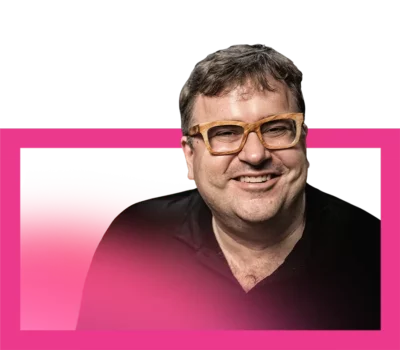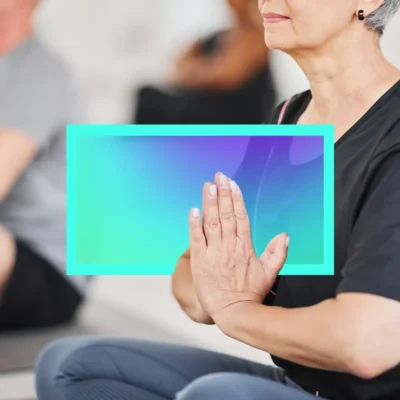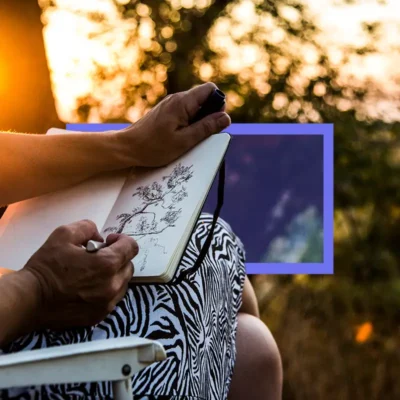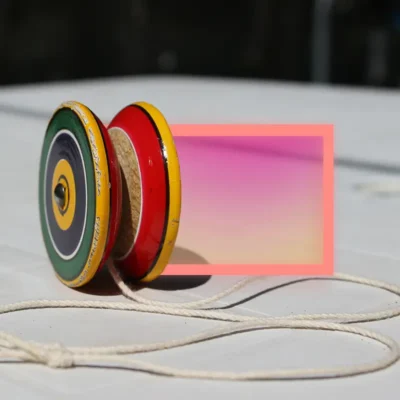Through friendship, a better version of myself
A misfit. Not a popular kid, not a jock. Just a non-group kid. This is how LinkedIn co-founder Reid Hoffman describes himself growing up. And as a misfit, he just bands together with other misfits — an alliance to survive. In this Meditative Story, Reid reveals a side of himself he’s not shared publicly before, taking us back in time to the great shift in the social fabric of his life, and how he thinks about friendship as the root to becoming the person we are meant to be.
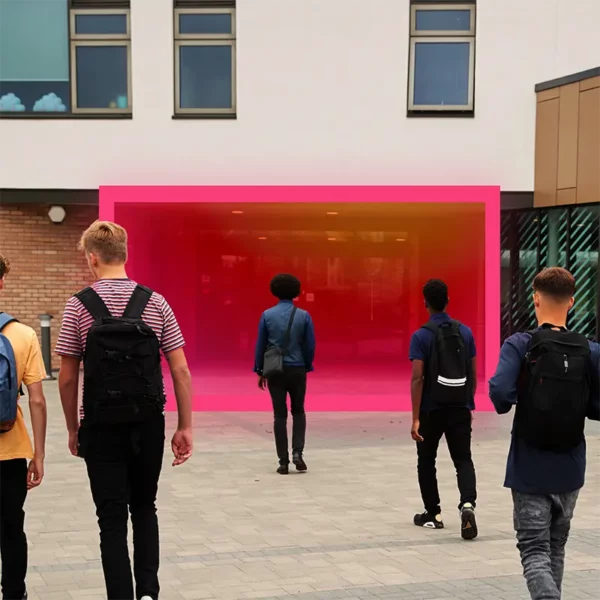
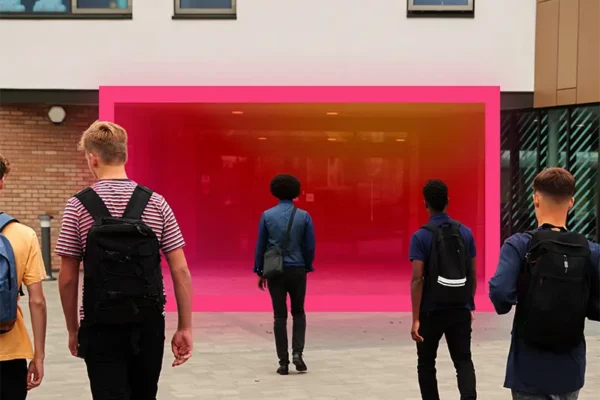
Table of Contents:
Transcript:
Through friendship, a better version of myself
REID HOFFMAN: I’m the kind of person who flowered in college. Before that, my friendships were the banding together of misfits. In high school, there are cliques. You have the popular kids. You have the cheerleaders. You have the jocks. And then the kids who don’t fit into groups. These are the misfits.
At every school I went to as a kid, I was one of these non-group kids. I have friends. But they’re not friends who think the way I do or even like the same things. It’s more that we all decide, “Well, ok. We’re the misfits from the various groups. So we’ll hang out with each other. We’ll be loyal to each other. We’ll form an alliance to survive.”
ROHAN GUNATILLAKE: Known as the “Oracle of Silicon Valley,” Reid Hoffman is a legendary entrepreneur who co-founded LinkedIn and invested in dozens of iconic tech companies that are now part of the fabric of our lives. His clear-headed wisdom makes him one of the most sought-after sources of advice, for everyone from heads of start-ups, to heads of state. Reid also hosts the podcast, “Masters of Scale” loved by millions.
Today, Reid shares an intimate Meditative Story about how he sees friendship as the impetus to become the best version of ourselves. It’s a rare glimpse of Reid, outside his public life and business.
In this series, we blend immersive, first-person stories with mindfulness prompts to help you recharge at any time of the day. I’m Rohan, and I’ll be your guide for Meditative Story.
The body relaxed. The body breathing. Your senses open. Your mind open. Meeting the world
HOFFMAN: I wake up to a crisp, cold mountain morning in Lake Tahoe, California. It snowed last night and as I walk out the cabin door I see powder dusted on the tree branches and on my first car, a 1972 convertible VW bug – white with a black roof. I love this car but it’s 20 years old and it’s testy. It won’t start.
I’m in college, and I’d driven with friends to my family’s cabin, which my grandfather had built by hand, I think around 1962. It’s not just in the style of a log cabin. The walls are literally made of logs that had been milled and hand stacked. This idea of building a house by hand is romantic but totally foreign to me and my friends. We live in San Francisco’s Bay Area and our world is more intellectual and digital than it is physical.
But we’re out here in the woods and my car won’t start. I have a Swiss Army knife on me. So I fidget to find the clasp and I lift the snow-covered hood of the car and look inside. The snow slides off the sides, a bit falls on the engine itself, and I’m face to face with the metal, tubes and belts. I take a deep breath – which turns to steam before my eyes – and ask myself, “Okay, what’s going on here?”
And let me be clear: No one at that cabin expects me to be the one who can fix a broken-down, old car in the snow.
But I remember something my grandfather taught me: that the points in the starter motor need to have a certain spread of space. So I eyeball that in the engine and the spread looks off. What I’m about to try is just short of a complete shot in the dark. But I thumb through instruments in my Swiss Army knife. I find one with roughly the right thickness to measure it, and then use the screwdriver to readjust it.
I step through the snow to the driver’s side, sit down on the old black vinyl seat, turn the key. The car starts up again. My friends are shocked. They’re like, “Oh my God, you know how to fix this.”
It’s a shock to my friends, because the digital world we live in is so far from the world of people who know how to use their hands. But it’s not an accident that I have that Swiss Army knife with me. I carry it everywhere, because of a highschool friend, whose name, incidentally, is also Reed. Reed Searle is a person who lives firmly in the physical world. He makes maple syrup and builds cabinets and believes you should always have a Swiss Army knife on you in case there’s something you need to fix.
I don’t share Reed’s mechanical interests or his abilities. I’m never going to learn how to farm maple-syrup with him. But our highschool friendship made me ask myself: What can I adopt from him that’s true to my own identity? And so, to this day, I still carry a Swiss Army knife in the glove compartment of my car, even though the car is modern, and I’m not sure there’s anything in it that a Swiss Army knife could fix.
This story of fixing a broken down VW Bug with just the Swiss Army knife in my pocket, it stands for something bigger. The ritual of carrying that Swiss Army knife, that’s a lasting gift from my friendship with Reed Searle. And every real friend of mine has given me that kind of gift. For me, friendship isn’t just a way to pass the time or a tool. For me, friendship is how I evolve into a better version of myself.
GUNATILLAKE: Does Reid’s ritual of carrying the Swiss Army knife make you think of anything you’ve adopted from a friend of yours? Bring it to mind. Bring them to mind. Notice how that ritual makes you feel. And if nothing comes to mind, that’s okay. Just picture Reid turning the screw under the hood of that VW Bug on that cold, quiet winter morning.
HOFFMAN: Friendship isn’t a passing interest for me; it’s the true center of my life. And this surprises a lot of people. I’m publicly known as an entrepreneur and investor but the business world isn’t my spiritual home. My primary spiritual home lies in how I experience friendship and the way it gives me the path to evolve as a human.
It’s through friendships we grapple with the essential questions of who we are and who we should be. Questions like: What is a meaningful life? What are our larger responsibilities as communities and as individuals? How do we make each other better as people, as human beings? The thing that sustains me – and has over the decades – are the friends who I share these kinds of conversations with.
I’m the kind of person who flowered in college. Before that, my friendships were the banding together of misfits. In high school, there are cliques. You have the popular kids. You have the cheerleaders. You have the jocks. And then the kids who don’t fit into groups. These are the misfits. At every school I went to as a kid, I was one of these non-group kids. I have friends. But they’re not friends who think the way I do or even like the same things. It’s more that we all decide, “Well, ok. We’re the misfits from the various groups. So we’ll hang out with each other. We’ll be loyal to each other. We’ll form an alliance to survive.”
And life as a teenager is about survival. There are always some kids who will band together by targeting the weaker ones. And so, the misfits, we get through it together.
But it’s in college when I really begin to find my people. I meet my friend Tom Oscherwitz the first week of freshman year. Tom has a gift for confronting topics that other people avoid. And we start to forge a friendship through his socially uncomfortable questions.
One day in the cafeteria he turns to me and asks: “Reid, why are we friends?”
“What do you mean?”
“Isn’t it true that we’re just friends with each other because we’re self-interested? It’s not this grand spiritual thing, but it’s just like, we fill a need for each other. And that’s why we’re really friends, right?”
To some degree, the statement undercuts the question. Because if we were actually using each other, we wouldn’t talk about it explicitly. But the fact that we could reflect on the very nature of our relationship, directly and head-on – and in this intellectual way – that’s the kind of thing I learn from Tom and it transforms my way of thinking. That’s where my identity really starts growing.
That first year in college, I spent most of my time talking to people. It’s not that I’m not interested in my classes. It’s just that I’m more interested in these people around me. I can’t help but think, “Wow! There are all of these incredible people, some of whom will be super close friends for the rest of my life. Let me go meet these people. Let me go talk to them.” The kids here are so much more like me. They have their own theories about human nature. They think about the meaning of life, in discourse, in reading, in learning, in growing, and in inventing.
And my focus in my friendships now shifts from “These are my allies getting through stormy weather” to “These are the people I can grow with. These people will help me become a better version of myself.”
I meet my friend Kyndaron freshman year, and she’s my first true female friend. We talk about the people we’re dating and what confuses us. We talk about things across the gender gap.
That Spring, Kyndaron creates an experience for me. She convenes a few of her female friends at the campus coffee house and invites me to sit with them. The deal is: They have a normal conversation with each other. I sit there and listen. But I say nothing. Zero interaction.
They talk about their lives as they’re experiencing them. They talk about dating. About family. About feelings. Raw details, sometimes even a moment by moment recounting.
I think to myself, “Wow, this is the kind of conversation you guys normally have? This isn’t the kind of conversation I ever have. That’s really interesting.”
This magical conversation is a kind of gift that Kyndaron gives me. It’s a lens into a world I don’t know: the conversational style; the openness with their feelings. Since then, my theory of friendship is that friends can basically talk about anything, because frank conversations expand your perception, your judgment, your wisdom, your compassion.
I start asking questions about other people’s experiences. And I begin to realize that my friends have wildly different experiences in life than I do. As a young white man in a society where white men are privileged, I learn to ask: What’s the experience that other races have? What’s the experience that women have?
And I learn that there are worlds my eyes don’t see. And the only way I can see them – even “through a glass darkly,” in that poetic sense – is by talking to people to find out what their unique experience is.
Friendship gives us the context to grapple with the biggest, most essential questions, and to define ourselves in the answers that match who we are and who we want to be. Obviously, a lot of people think about the question: What is the meaning of life, generally? And what is the meaning of my life? There are so many questions to ask together.
Why is my life important?
Why is the meaning of my life about more than just me?
What is the role I’m playing in the world around me?
How can I be a better friend to my friends?
Am I a friend to humanity?
Can I expand the notion of friendship to think about all sentient beings?
These questions are the tapestry. And from a very early age I think we all start learning the answers to these questions through friendship: How am I good to people? How do I evolve to be about more than just myself? I think that friendship is the path by which that happens.
GUNATILLAKE: Which of these questions that Reid has just shared resonates most with you in this moment? Hold that question in your mind. Hold it in your body. Hold it.
HOFFMAN: Like most people, I have less and less natural interaction with my friends today. They’ve spread out geographically and live in places I don’t normally get to. The busy-ness of adult life means I have less and less time for things that aren’t part of my daily routine or the tidal wave of my business life. But I find that my true friends and I pick up quite quickly. Literally, I can see someone after a decade of not seeing them, and within minutes, we’ve picked up with that deeply familiar rapport. It isn’t that our lives are static, but rather because the foundation of our friendship is strong enough and timeless enough to withstand the large gaps of time.
I still see my friend Tom every Christmas when he visits California to see family. We go for a Christmas Day brunch at the same Chinese restaurant he went with his family as a kid. This year, we sit down at a glass-top table with small ceramic tea cups – the kind you’ll find in Chinese restaurants all over the U.S. We order Kung Pao chicken and egg rolls and within minutes, we pick up where we left off the year before: “Here’s what I’m trying to do in life. Here’s what I find meaningful.”
The conversation turns toward family, because Tom is a father.
“How are you evolving as a Dad?” I ask him.
He looks at me with his “I’m going to tell this to you straight” look and says “Well, everyone talks about parenting like you’re just floating all the time on a cloud of bliss of love for your children. But Reid, I think most people just say that because that’s the comfortable thing to say. The truth is: Sometimes the kids are really irritating. It’s like, ‘Hey, that’s irritating! I love you anyway, but I’m really irritated!’”
So Tom is very much the same. He still heads straight for the blind spots that other people avoid. But Tom and I also talk about how we’re changing with the years. When we first became friends in college, no mountain was too tall and no problem was too hard. Now, it tends to be a little bit more like, “I have this interesting idea. But ehhhhhh… I think that goal is unreachable.”
What does that mean? Are we becoming more jaded and cynical? Are we diminishing ourselves? Should we fight to keep our idealism? Or are we just becoming more wise about what’s really possible or not?
That kind of question, I don’t think we have an answer for it. Like so many interesting questions, it leads to a thicket of questions, the answers to which go well beyond any one lifetime.
And it’s friends who help me continually ask those questions and grow as an individual, as a person. When I look at my life and ask myself: What makes me feel more human, more compassionate, more wise? Where am I learning? How am I growing? It is always from friendships. Whether you’re an introvert or an extrovert, whether you have one true friend or many, these friendships are what give our lives’ fabric, and meaning, and joy. As you learn friendship, you also learn to be a better friend with yourself. The older I get, the more I believe the meaning of life is given through our relationships with other people.
Rohan’s closing meditation
GUNATILLAKE: The thing I most appreciated about Reid’s story was how his friendships revolved around good questions. So for our meditation together, I’m going to pick up that thread. There are several meditation traditions whose primary practice is asking questions and using those questions to help orient the mind, to turn the mind towards insight and wonder. The point is not to get the perfect answer but instead just to look, because it is through looking that we learn. And it is through learning that we become wise.
So from here on in, this meditation will just be a series of questions. So I hope you have fun, that is my intention.
What is the best way you know of settling down? What is most reliable? Is it taking a few deep breaths? Is it resting the awareness in the body? Where in the body do you find it most straightforward for your attention to settle?
And what is happening now? What is happening in the body? Are there any parts of the body which particularly stand out? What is happening in the mind? Are there any particular mental patterns or feelings that particularly stand out? What is happening? Can you be aware of what is happening while it is happening? Gentle and open.
When your next thought pops up, can you catch it? How about now? Can you catch the next thought? When you actively decide to try and catch your next thought does that make the gap between thoughts longer or shorter? While you watch your thoughts, are there any connections you can notice between the chains of thoughts?
Switching away from the mind, what is happening in the body? Do you have a sense of the body overall? Or is a particular area calling out for attention? Right now, what is the most prominent physical sensation you are aware of? Can you magnify how you look at that sensation and discover any fine details? Does this sensation have boundaries? Is it hot or cold? Is it static or is it dynamic? What can you discover about it?
Ok. How do you feel after having asked all these questions? Is the mind a bit frazzled or is it at rest? What is your most reliable way to come back to steadiness and balance? Do you trust that you know what to do?
Thank you. That has been a lot of questions. You’ll be glad to hear that they’re over now.
And remember, the purpose of questions in meditation is not to come up with answers but to point out, to orient the mind. We have so much natural wisdom within us, but sometimes we need the right questions to help us access it.
Thank you.
